LOC/Precision Graduator
LOC/Precision - Graduator {Kit} (PK-16) [1986-]
Contributed by Todd Harrison
| Diameter: | 2.63 inches |
| Length: | 40.00 inches |
| Manufacturer: | LOC/Precision  |
LOC Graduator review is provided courtesy of:
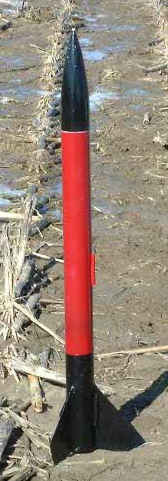 This rocket is a popular LOC kit for people new to composite motors. I liked the looks of the rocket and was in need for a new kit in that power range (D-G). The Graduator came promptly and packed well, however, the shipping company had still managed to kink the body tube. I contacted Barry, the new owner of LOC, and he shipped out another tube without question that also arrived on my doorstep in a timely fashion.
This rocket is a popular LOC kit for people new to composite motors. I liked the looks of the rocket and was in need for a new kit in that power range (D-G). The Graduator came promptly and packed well, however, the shipping company had still managed to kink the body tube. I contacted Barry, the new owner of LOC, and he shipped out another tube without question that also arrived on my doorstep in a timely fashion.
Now that all the parts were here it was time to build! After test fitting the parts (which were all snug fits) and looking over the instructions (one-sided/brief), I decided to bevel the edges of the plywood fins. I swept each side of the fin’s edges through a grinder too create a nice bevel with minimal work. I lightly sanded them to remove any imperfections from the grinder. Next came the motor mount assembly. This consists of 2 centering rings, a 29mm tube, a baffle, and 24/29 motor adapter. I attached the centering rings with 15min epoxy after they’d been lightly sanded. I opted to not epoxy in the baffle unit since I plan to use some longer 29mm motors and the baffle might prevent them from being inserted. However, this is a nice addition to the kit that is not usually seen in similar kits by other manufactures. Next, the motor mount was slid into the tube and secured by 15min epoxy. This rocket was going to be the testbed for a fillet technique that I’d read about. After the motor mount was dry I popped one fin into the slot and dammed up the forward and rear end of the fin root with masking tape and wood. The rocket is placed at a 5 degree angle (nose end down) and the fin should be at approximately a 45 degree angle with the floor. I then mixed up a small (one pump) batch of West Systems epoxy (105/206). 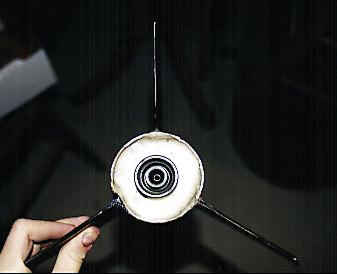 The epoxy is thin and runs easily. I poured a small amount into the fin root near the aft dam and it slowly flows down the root. Once it reaches the forward end, the rocket is placed horizontal to the ground and the epoxy will level. Some will seep into the tiny void between the slot edge and the fin which locks the fin in the slot. This is critical and convenient because the fins don’t extend all the way to the motor mount so they need this extra reinforcement. A second dose of epoxy might be needed since some has flowed inside the tube. Once cured, the fillet is in near perfect and glass smooth. This process is repeated for each of the other 5 roots. This process is quite time consuming, however, the outcome is very rewarding. Once the fin can was complete I moved onto the recovery system. This kit comes with the typical LOC shock cord mount, a nylon string. It is looped, knotted and epoxied to the inside of the airframe. At first glance, this type of shock cord mount seems insufficient, but I’ve personally never had one fail. This was again epoxied with 15min. The kit comes with an elastic shock cord that attaches to the nylon string and nosecone eyelet. The parachute is a standard one piece 18” black nylon chute. The final construction step was to attach the 1/4” launch lugs to the airframe. It needed to be cut in two and sanded to properly support the rocket.
The epoxy is thin and runs easily. I poured a small amount into the fin root near the aft dam and it slowly flows down the root. Once it reaches the forward end, the rocket is placed horizontal to the ground and the epoxy will level. Some will seep into the tiny void between the slot edge and the fin which locks the fin in the slot. This is critical and convenient because the fins don’t extend all the way to the motor mount so they need this extra reinforcement. A second dose of epoxy might be needed since some has flowed inside the tube. Once cured, the fillet is in near perfect and glass smooth. This process is repeated for each of the other 5 roots. This process is quite time consuming, however, the outcome is very rewarding. Once the fin can was complete I moved onto the recovery system. This kit comes with the typical LOC shock cord mount, a nylon string. It is looped, knotted and epoxied to the inside of the airframe. At first glance, this type of shock cord mount seems insufficient, but I’ve personally never had one fail. This was again epoxied with 15min. The kit comes with an elastic shock cord that attaches to the nylon string and nosecone eyelet. The parachute is a standard one piece 18” black nylon chute. The final construction step was to attach the 1/4” launch lugs to the airframe. It needed to be cut in two and sanded to properly support the rocket.
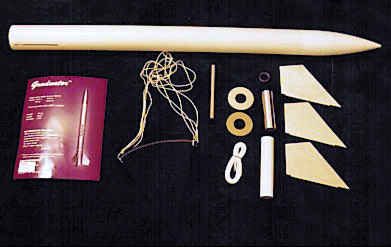
For finishing, I first filled and sanded any ruts with Bondo filler and once complete I applied a coat of gray primer. I painted the fin can and nosecone gloss black and the mid section a cranberry red.
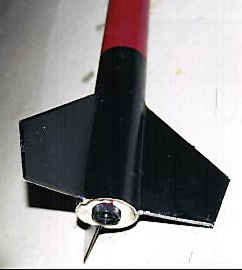
For the first flight I loaded her up with a F52. I attached a Nomex® heat shield (Courtesy of Dave Pacheco) to the shock cord. The 1/4” rod was grungy and a tight fit so I move her down to a 3/16” which was just slightly loose. At liftoff she jumped off the pad and headed into the wind. The chute deployed on cue and brought her home safely. Despite the 10mph winds the Graduator was recovered fairly close to the pad for a successful flight. Next, I headed down to Pennsylvania in March to launch with PARA. I was in a good mood and decided to give her a ride on an H128. I prepped the motor the night before and headed out to the site at about 9:30 the next morning. I got caught up watching others fly and while prepping the Graduator’s recovery system at about 10:45 the winds started to kick up. I was finally ready to launch but when I got out to the pad the rod was wayyyy to tight. I had to run back to the car and sand the lugs. I realized that the uppper lug was slightly off center which wasn’t helping my cause. I removed the lug and whipped out the 5 minute epoxy. While she was drying the winds were getting worse and they eventually the range was shut down. Bummer! The weather up in New England has been horrendous and I still have the H128 loaded hoping to launch eventually. However, One weekend I decided to go out with a couple buddies at launch locally. I loaded up a G35 because I didn’t want to launch the H128 at an unorganized launch and the site was a tad bit too small. I flew the Graduator off a 3/16” rod once again. She roared off the pad on a nice plume of Econojet smoke. Deployment was right at apogee and she came down gently not very far away. There was absolutely no damage.
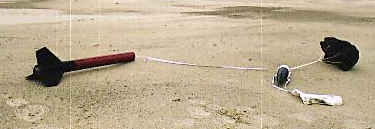
This is a great kit, but if you do decide to purchase it, I have several suggestions. The cardboard lugs must be cut in two, so you should replace them with 1/4” brass or copper piping. This is the second time I’ve had trouble with lugs. Many people would also recommend modifying the fins so they go all the way to the motor mount. However, for this kit I do not think it is necessary. If you put a little extra effort into the fillets and reinforcement, the fin can will be rock-solid and will stand up to a lot of beatings. In conclusion, this is a great quality kit that is well worth the money and it’s an excellent flier!
Written and submitted by Todd Harrison for Rocketry Online -- Copyright 1996-2000
Other Reviews
- LOC/Precision Graduator By Mark Trotter
(by Mark Trotter) This is a great kit to get you into the more advanced, mid-power rocket kits, but I would still recommend getting a novice kit first. The Graduator has the great feature of through-the-wall tubing which decreases the time and effort for you. It also comes with the LOC MMA-1 motor adapter to fly it on 24mm motors. The only problem, there is no type of "motor ...
- LOC/Precision Graduator By John Hogan
Brief The Graduator is an excellent rocket for those wishing to get into mid/high powered flight Construction The tubing, fins and everything were of excellent quality. The instructions were brief (few illustrations), but adequate. The preslotted tubing made fin installation straightforward, and all parts fit together nicely. I highly recommend reinforcing the fins so that they are ...
 |
 |
Flights
 |
 |
R.T. (November 1, 1999)
J.C. (February 1, 2000)
G.B. (May 1, 2000)
K.W. (June 1, 2000)
J.S. (January 1, 2001)
S.B. (January 1, 2001)
M.R (January 1, 2001)
J.S. (August 1, 2001)
P.V. (December 15, 2001)
G.B. (August 30, 2002)
J.S. (April 26, 2003)
(June 16, 2004)
B.P (March 18, 2008)
 |
 |
D.H. (September 1, 1999)